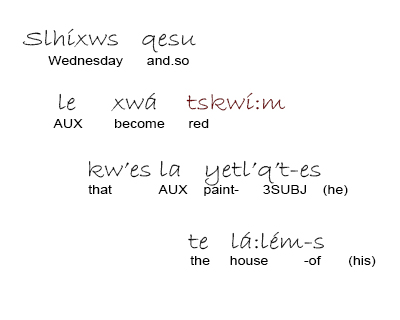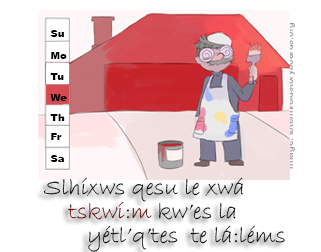Slhíxws qesu le xwá tskwí:m kw’es la yétl’q’tes te lá:léms means ‘Wednesday he paints his house red’.
Literally it means ‘Wednesday and.so (it) becomes red that (he) paints the house (of him)‘.
Vocabulary and Pronunciation
- Slhíxws –Wednesday
- qesu –and so
- le – an untranslatable ‘auxiliary’ (‘helper’) verb, a reduced form of lam – to go
- xwá – to become
- tskwí:m – red
- kw’es – that
- la – an untranslatable ‘auxiliary’ (‘helper’) verb, also a reduced form of lam –to go
- yétl’q’t –to paint
- -es – here the –es ending is required because the understood person doing the painting (understood ‘he‘) is a third person (i.e. neither me nor you). A certain kind of verb (including yétl’q’t) requires the –es in this situation.
- te – the
- lá:lém – house
- -s – here the -s means ‘of‘, indicating that the house is possessed by understood ‘him‘ or ‘his‘.
Audio: Elizabeth Herrling
Stucture
The structure of this phrase is as follows:
 The person painting (he) is just understood from context. Because this person is a ‘third person’ (i.e. not me or you), verbs like yetl’q’t require the –es ending labelled ‘3SUBJ’ above.
The person painting (he) is just understood from context. Because this person is a ‘third person’ (i.e. not me or you), verbs like yetl’q’t require the –es ending labelled ‘3SUBJ’ above.
Similarly, the possessor of the house (‘his‘ or ‘him‘) is not overtly stated. The –s ending (roughly equivalent to English ‘of‘) indicates that a third person possessor is present, if only understood.


No comments yet.